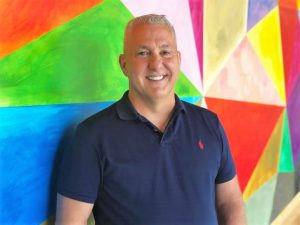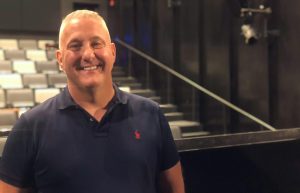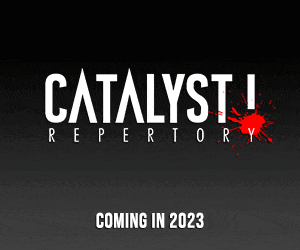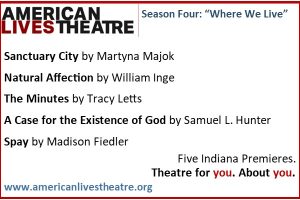
Before the February 28 opening of “The Agitators” at Phoenix Theatre, I first began communicating with Bob Lehman, who, at that time, was the new director of marketing at the theatre. On September 1, he was promoted to an expanded role of director of sales and marketing. By the time I met Lehman in person on opening night, I had already started noticing changes in the Phoenix’s branding, as reflected in the graphic design and copy on its marketing materials, website and social media. I was also aware of a freshness in both his approach and the personality that Lehman brought to his role in representing the theatre.
Over time, I learned more about the New Albany, Indiana native, who had returned to his home state after years of living in California. Prior to returning to Indy in 2019, Lehman served as the executive director of Finest City Performing Arts, Inc., an LGBTQ mission-based performing arts company, which includes the San Diego Gay Men’s Chorus. During his time leading the nonprofit, it became one of the largest and most well-known choruses in the world and was featured on the Today Show, CNN and Good Morning America. When he left the oganization there were 200 men in the chorus on stage and 500 members. During his time at the helm of the chorus, Lehman was also a nationally recognized leader in the fight for LGBTQ equality.
A U.S. Marine Corps combat veteran (he served from1983-1993), Lehman was one of the country’s most outspoken activists in ending “Don’t Ask, Don’t Tell” and became the first openly gay veteran to serve on a U.S. Congressional military advisory board. He and his husband Tom Felkner, who have been together for 27 years, were national leaders in the fight for marriage equality, making history as the first two men to legally marry in California history. Two San Diego mayors have honored Lehman with a day in his honor for his community service and in 2016, the city named him “Humanitarian of the Year.”
I was intrigued to learn more about Lehman and his background, so I reached out to him for an interview that took place in the lobby of Phoenix Cultural Centre in downtown Indy, as well as through subsequent emails. Below is an edited transcript of our communications.
What brought you to Indianapolis?
The Marine Corps got me to California and I never really returned to Indiana except to visit. I relocated to Indy because it was in the center of the state near my father, who lives in New Albany and I thought I could find the kind of work I was looking for here. I interviewed at a few places, but the Phoenix was probably more in my wheelhouse because it was mission oriented.
What did the Marine Corps teach you?
I served in the Marine Corps for 10 years, including in combat during the Persian Gulf War aboard the USS Carl Vinson aircraft carrier, where I oversaw guarding its nuclear weapons. During that time, I learned about the importance of serving your community, being part of something larger than yourself and, finally, being true to yourself.
To that last point, during my final two years of active duty, I was assigned to be a recruiter in Chicago. This meant that even though I was gay myself, I had to ask potential recruits if they were homosexual. That mind-numbing experience drove me to leave the service in 1993 and immediately begin my work to fight the ban on gays in the military. After nearly two decades of fighting “Don’t Ask, Don’t Tell,” we eventually won the freedom to serve openly under President Obama in 2011.
When did you start at the Phoenix?
I joined the Phoenix on October 30 of last year. I came in for my first night for their fundraiser. It was their Halloween fundraiser and I came dressed in costume.
Had the change in artistic management already occurred?
Yes, everyone was already in place after the transition and it had already occurred, so they were just getting into their holiday show “Winston’s Big Day.” The art work had already been created for that, so I started doing some changes and a little bit of the marketing and things like that.
How did you deal with the controversy surrounding Bryan Fonseca’s resignation?
For me, it was starting to establish new relationships and build new relationships.

Bob Lehman – Courtesy of Tom Felkner. Used with permission.
Did it help that you did not carry any baggage?
Right. I didn’t know what I was coming into, but I was just looking forward. And one of my skills is developing relationships. I am about bringing people together, so I immediately started reaching out to people at the IndyStar and people in media to introduce myself and reintroduce the Phoenix to them in this new location.
What was your opinion of the brand up to that point?
Part of why I fell in love with the Phoenix before I even joined was some of the branding that was here. The building was a huge part of it and the mission was another part, so I knew I could embrace both. My goal was to come in and change the marketing to reflect what this building says.
What sorts changes did you make on the onset?
I brought in a new design and things in social media overnight. I felt the social media was lacking and needed to be updated, so I changed the branding a little bit right away. People noticed the new artwork, designs and communications with professionals like yourself about changes that were occurring. Many could already tell it was happening.
Did you hit the ground running?
Yes, and I think one of the things I did was I came to see a show before anyone knew me here. I was already working for the theatre. The show was “Vino Veritas,” but, in general, they did not know me yet. I came in and watched the show. I wanted to see what the experience was in the theatre as just a patron. I knew right away that experience needed to change. There needed to be a warmer greeting. My goal was for people to come to the Phoenix and have fun, no matter what kind of show they are seeing, and for the entire experience, from the curtain speech to the moment they exit the theatre, to be a positive one.
Coming into a new community, what did you do to learn the lay of the land?
I always do my research when I apply for a position. With the Phoenix, I went through all their social media and read their press. I started meeting people through Facebook. I friended people through the theatres. I joined the Indianapolis Men’s Chorus to try to meet new people and start networking. I was used to being in a city where everyone knew me, so coming to some place new, I just started meeting people through activities. I also joined the softball league and started coming to events here at the theatre and met the actors and designers and theatre people in general.
I understand your husband Tom has a degree in marketing. Are you a team?
He worked for a major accounting firm as a head of communications and has a master’s degree in marketing. He is volunteering a lot for the theatre and does help in the marketing area. It helps to have him to bounce ideas off.
How important is marketing to a theatre?
A lot of nonprofits suffer from not having a strong marketing program. They forget how important it is, especially social media these days. You need a really, really strong approach and we have one. We reach tens of thousands of people through social media. With social media, we can measure and communicate with our patrons right away. And they can talk to us and ask questions and share things. You can get to know them. There are people who can walk into the theatre now and I know who they are because I follow them on social media and in many cases become friends with them. We put most of our effort into Facebook since it is the industry standard. You can just reach more people that way, but we do, we cover all the bases.
Any upcoming events occurring at the Phoenix Cultural Centre?
Yes, but not in the way you may think. At the onset of the shutdown, we began to think about how we could use our building space to do good for our community, rather than just let it sit idle. The answer was our neighbor, just up the street, the American Red Cross of Indiana, which was facing not only a major blood shortage, but a shortage of locations since so many schools, churches and businesses had shut down.
We saw a partnership with the Red Cross as a great opportunity to help and soon thereafter set up our first blood drive. With all safety protocols in place, we filled every opening with Phoenix actors, staff, board members, friends and neighbors. Our next blood drive is set for Saturday, Oct. 24 from 10:00 a.m. to 4:00 p.m. and you can sign up at PhoenixTheatre.org.
What is the status of your reopening?
That’s the million-dollar question. We are eager to get back to work and do what we love to do at the Phoenix. But, like everybody else in the performing arts world, our reopening plans focus entirely on the health and safety of our people and patrons. So, for now, we continue to assess and make decisions based on CDC guidelines, state and local requirements, and the safety rules set by our union, the Actors’ Equity Association.
We have tentatively scheduled our season to reopen at the end of February 2021 with “Alabaster” by Audrey Cefaly, followed by “Detroit ’67” by Dominique Morisseau, and “Love Bird” by K.T. Peterson. However, on November 1, we will once again assess the pandemic landscape and decide then how and when we will reopen.
What I can say for sure is that when people do return to the Phoenix, they will walk into an already state-of-the-art building that has been rigorously enhanced for everyone’s safety. For example, we are installing ultraviolet germicidal irradiation technology to reduce airborne COVID transmission. We’re also enhancing our ventilation systems, installing hand-sanitizing stations and increasing cleaning and disinfecting procedures using only EPA approved virucides with an electric atomizer fogger to disinfect the building.

Bob Lehman – Coutesy of Tom Felkner. Used with permission.
How are you keeping your audiences engaged in the meantime?
Creativity is the magic word. Every day, we are re-imagining how we keep our audiences engaged as the COVID world keeps changing. No week or month is the same as the last. This remains true as we shift to virtual programming and promote our content through our social media platforms like Facebook, YouTube, and our e-newsletter and blog. We now reach more than 40,000 people each month, in nearly every state from California to Texas to Florida to Maine, and in countries including India, Singapore, Canada and England.
The key has been the creation of a robust mix of content. In the past six months, we have presented 20 online “Lunch Club” classes led by local artists on topics from dance to playwrighting. We don’t charge, but we do accept donations to help us pay the artists to help keep them working. We are on our eighth episode of our studio interview series featuring in-depth conversations with our artistic director Bill Simmons. And we’ve presented a variety of live, virtual cast readings, talkbacks and lookbacks, giving artists and audiences a chance to enjoy live theatre from the safety of their homes.
For the holidays, we’ll soon be announcing our Stories of the Season series in partnership with the Indianapolis Public Library. We’ll have actors present fun and dramatic online readings of holiday books for kids and kids at heart from “How the Grinch Stole Christmas” to books celebrating Kwanzaa and Hanukkah.
Are you looking for more ways to partner with community groups for use of the Phoenix?
Yes, absolutely. We view collaborations with community partners as the model of the future for performing arts and the natural progression of our collective membership of Summer Stock Stage’s Eclipse, Phoenix Rising Dance Company and Summit Performance Indianapolis.
In fact, we’ve been working on several ideas we hope to launch in spring 2021 that will create multiple opportunities for us to work with all types of community and arts groups. First, we are looking to develop the area outside of our Odyssey Room to include a small performance stage. And, on a much larger scale, we plan to develop our parking lot into a new outdoor venue that will enhance the work we do indoors. Under COVID restrictions, this space could still safely hold 250 people for outdoor concerts, events and perhaps even a play or two!
How much of your staff is furloughed?
From the onset of the pandemic, we worked especially hard to keep as many of our staff on board for as long as possible. We took full advantage of the Payroll Protection Program and even held a four-hour, online Give-A-Thon to supplement lost income.
Unfortunately, by early summer, we had to make the extremely difficult decision to reduce our staff by half to six full-time and two part-time positions. What remains is a very tight-knit group, each of us taking on new responsibilities to keep our organization moving forward.
How has fundraising been affected?
As with our artistic programming, we’ve had to rethink how we interact with our donors who are so important to helping us weather the pandemic. A good example is the virtual Give-A-Thon I mentioned earlier that took place in May. It was one of the first of its kind and featured 30 artists and guests while raising nearly $40,000.
What is your reaction to Bryan Fonseca’s recent passing?
My first thought was regret that I had not had the opportunity to meet him personally, and then sadness that he was gone. I think most people admired Bryan as a trailblazing pioneer in the arts, both as the founder of the Phoenix and Fonseca Theatre Company. He represented voices that weren’t being heard and communities not being seen.
For me, it went beyond that. I admired Bryan’s artistic achievements, but even more so, I respected what he accomplished as an openly gay man. For many decades, he was a much-needed role model for Indy’s LGBTQ+ community and he brought our stories to the stage from “Love! Valour! Compassion!” to “Angels in America.” He took heat for his convictions and lost sponsors as a result, but he stayed true to himself and his people.
Any plans for the Phoenix to memorialize its founder?
I kow there have been several ideas discussed by board members and staff for memorializing Bryan at the Phoenix beyond the dedication of our main stage in his name. I know we’ll want to do everything possible to recognize his Phoenix legacy and honor him as our Producing Director Emeritus.
What are your impressions of Indy?
You know, I love it. I am really excited. Coming from California after all those years, I forgot about the change of seasons. Because of COVID, I have been working from home the entire time. I live on the Monon Trail, so every single day, almost from when I started, I have walked the Monon for 40 minutes.
I have seen the changes here. I love the arts scene. There is such a variety here. Everything from the Indiana Repertory Theatre to the IndyFringe Festival and everything in between. I am really excited to see more of that. The Phoenix, I think, is right there. It is the right kind of size that I want to be involved with, where I can really communicate with people and make a difference.
How have you and your husband Tom been accepted?
I feel like I have the best neighbors I have ever had in my life. They couldn’t be nicer. For the first time, we are living in a neighborhood filled with children and families and it has just been great. Indy has been very welcoming and the Phoenix has too. They have embraced Tom. It makes it so much easier to be here. Our relationship has just not been an issue.
What is your gauge of what you see in terms of politics?
That was one of my concerns. San Diego is very progressive. When I first went to San Diego in the 80s in the Marine Corps, it was very conservative. It was a military town. Over the years, it has changed. It is very likely the next mayor will be gay. He’s a good friend of mine. So, that is a drastic change. So, coming to Indiana, I wasn’t sure what to expect. It wasn’t so long ago they were dealing with Governor Pence and discrimination related to the LBTBQ+ community. Coming out here, that was one of my biggest concern. The biggest chunk of my career in marketing was growing a gay organization, which I had to include on my resume. I was concerned about that when applying for a job and it made me a little nervous. But when I interviewed for the Phoenix and eventually started working here, it just wasn’t an issue at all, so that really made me feel good. Of course, the theatre presents work that celebrates diversity. I wasn’t too involved with “Vino Veritas,” but the first show I saw from the very first reading was “Winston’s Big Day,” and most of the cast was BIPOC. It had a gay story line about the two main characters finding love. So, that made me feel really welcome and I was in the right spot. I started an “Out Night” for “Winston” and brought in LGTBQ+ members as a group to experience the show and find out what the Phoenix had to offer.
Do you agree the gay community, or members of any other minority community, are not monolithic and not all necessarily arts fans?
Absolutely. I had to sell choral music to gay people in San Diego and the goal was to change what people thought it was. You do that with your programming and your marketing and it is a matter of coming in here with your friends and your family and the family you choose and having fun. And that’s what it is all about. I think I can do that with any show the Phoenix puts on, whether it is your cup of tea or not. I really believe if you get in ‘em in the door once, they’ll come back. It may not be the next show or play, but once they come in and experience our family, they’ll start to identify with it and I will get them to come back again.
What outcomes do you hope to achieve at the Phoenix?
I am about getting people in the seats. It’s already working. We were on track to break records with “The Agitators” before COVID-19 struck. That was my first show that I had from beginning to end. We were going to break a record. We were going to pass our holiday shows in tickets. And I think that is how you accomplish your mission. You may be mission oriented, but you can’t accomplish it if people aren’t in those seats.
I am working harder now than I did before COVID, so that is how we are putting in time to get ready for what comes after COVID. Next year, we are hoping to launch season tickets. In the past, we offered a pass where you could buy two or three shows and we’ll do that. Ticket sales have been great. Our social media has grown exponentially since I have come on board. I measure us against the other arts organizations in town. It gives me a guide of how we are doing, so I know we are doing very well.
How are your collaborations with other arts organizations?
Great. I think it is the key to success. I am not…this thing about competition…I don’t believe in that. I don’t believe we are competing against the IRT or Fringe or anyplace. I think …if one of us rises…we all go up. Everybody has a story to tell and if I share a post from the IRT and they get a lot of hits from it or somebody buys tickets, I am OK with that. I want people to come downtown. To see shows. To see what Indy has to offer. Go to restaurants and make this a great experience.
Who are your biggest influences?
As a gay-rights activist for more than two decades, my life has been heavily influenced by civil rights leaders including Harvey Milk, Martin Luther King, Jr., Cesar Chavez, and my personal mentor and friend, gay-rights pioneer Nicole Murray-Ramirez. I admire each of these people for their bravery, their sense of equality and ability to bring people together at a grassroots level to peacefully enact change and make the world a better place.
The proudest moments of my life, including my marriage, live within their legacies. I truly believe that we all stand on the shoulders of those who fought before us.
For information about Phoenix Cultural Centre visit phoenixtheatre.org.







